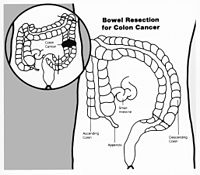
Photo from wikipedia
The role of palliative surgical resection in recurrent or metastatic gastric cancer is still controversial. A retrospective review was conducted on 689 patients who received palliative chemotherapy for recurrent (n = 307)… Click to show full abstract
The role of palliative surgical resection in recurrent or metastatic gastric cancer is still controversial. A retrospective review was conducted on 689 patients who received palliative chemotherapy for recurrent (n = 307) or primary metastatic (n = 382) gastric cancer. Among 131 patients (89 primary metastatic and 42 recurrent) with surgical resection before chemotherpay, 75 underwent gastrectomy, 42 metastasectomy, and 14 gastrectomy with metastasectomy. The median overall survival (OS) of patients who underwent surgical resection was significantly longer than that of patients who received chemotherapy alone (18 vs. 9 months, p < 0.0001). The OS benefit of surgical resection was consistent across subgroups. In multivariate analysis, surgical resection was independently associated with favorable OS (hazard ratio = 0.42, p < 0.0001). Moreover, patients with surgical resection showed favorable OS both in univariate (p < 0.0001) and multivariate (p < 0.0001) analysis even after propensity score matching. In addition, the median OS of patients who underwent gross complete resection (n = 54) was significantly longer than that of patients who underwent incomplete resection (n = 77) (30 vs. 15 months, p = 0.002). The present study suggests that judicious use of surgical resection before chemotherapy in recurrent or metastatic gastric cancer patients may result in a favorable outcome, especially when complete resection is achievable.
Journal Title: Scientific Reports
Year Published: 2019
Link to full text (if available)
Share on Social Media: Sign Up to like & get
recommendations!